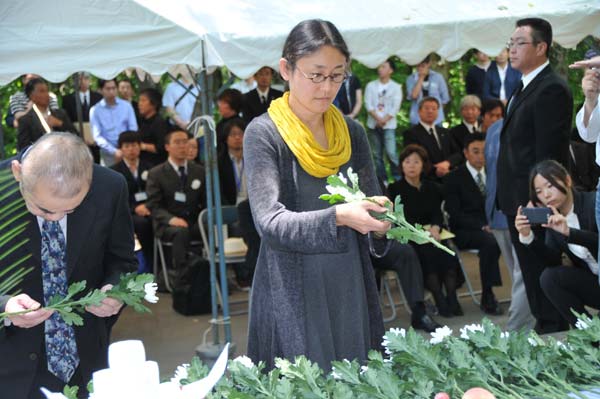Banknote buys new vision of history
Updated: 2014-02-24 09:31
By Cai Hong (China Daily)
|
|||||||||||
 |
|
Japanese people lay flowers at the memorial in Odate to commemorate the deaths of the Chinese laborers in the 1945 riot. Photo by Wu Gufeng / Xinhua |
Official Chinese government statistics show that 300,000 people were killed during the six-week operation that began on Dec 13 that year.
By the time the war in the Pacific ended, Tanaka was in the third grade. At school, he was taught that the conflict began with the attack on Pearl Harbor and was ended by the use of atomic bombs at Hiroshima and Nagasaki.
Moreover, the official version claimed that Japan only fought the United States. Shortly after the war, Tanaka, along with other young people, began studying English, nursing the ambition of building Japan into a US-style country.
"This is the way people of my age know about the war," Tanaka said. "Had I not got to know those foreign students, I would have lived with this false knowledge for the rest of my life."
More windows to the ugly chapters of Japan's wartime history had been opened, appealing to his better nature. Moreover, they changed him into an activist, and he has since worked to educate his compatriots about the facts of history.
Late last year, Tanaka joined a number of Japanese scholars and veteran diplomats to push the government to abide by what has become known as "the Murayama statement".
"Since Prime Minister Shinzo Abe took office, historical negationism has reared its ugly head in Japan," he said. "Therefore, it's necessary to raise public awareness of the importance of the Murayama statement."
In a 1995 statement, the then-Japanese prime minister Tomiichi Murayama apologized for the country's "mistaken national policy ... [that] caused tremendous suffering to the people of many countries, particularly those of Asian nations". During a recent trip to Seoul, Murayama said his statement was of crucial importance to the country's future.
On Feb 12, describing the "comfort women system" - a euphemism for the system under which women were forced to work as sex slaves for the Japanese military during the 1930s and '40s - as an "indescribable wrong", Murayama told the National Assembly in Seoul that Japan needs to resolve the issue and confront other historical wrongs.
But as Japanese politics and society appear to be moving increasingly to the right and conservatives still seem reluctant to confront their country's war record, concerns have arisen over the effectiveness of the Murayama statement.
Related Stories
Japan urged to explain nuclear material storage 2014-02-21 20:32
China slams Japan's attempt to overturn aggression history 2014-02-21 19:22
S. Korea slams Japan's attempt to retract sex slavery 2014-02-21 15:58
Beijing opposes Japan's Taiwan ambitions 2014-02-20 02:43
China wants Japan to remain nuke-free 2014-02-17 21:31
Today's Top News
Pandas arrive in Belgium
China urges US to correct mistakes on Tibet
9 punished for spreading flu rumor
Beijing upgrades haze alert
Ukrainian parliament dismisses president
China strongly opposes Obama-Dalai meeting
Tax refunds to lure overseas tourists
Prosecutors tackle food crimes
Hot Topics
Lunar probe , China growth forecasts, Emission rules get tougher, China seen through 'colored lens', International board,
Editor's Picks

|

|

|

|

|

|





